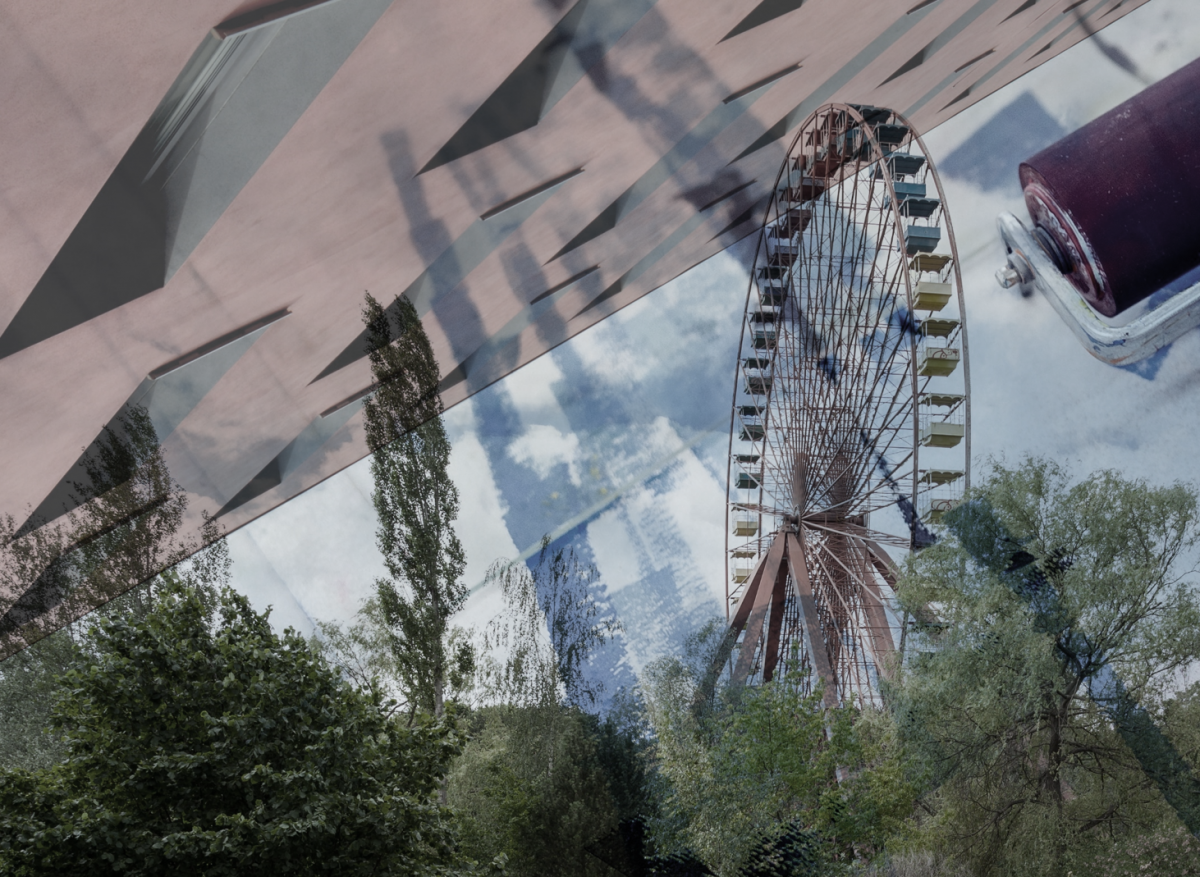ZKR Projects in 2019
Creative Workshops in the Spreepark
Since 2016, Grün Berlin has been devising a usage concept for the Spreepark with the aim of bringing together art, culture and nature in a unique way. Until the finalisation of the park’s development, we will be experimenting with interactive formats that combine environmental and cultural education with creative forms.
Building on the success of the performative tours in 2018, in summer 2019 the ZKR was cooperating with various artists on an exciting range of topics that focus on the Spreepark site. From June to October 2019, nine artists, artist groups and cultural actors presented experimental workshops that placed a special emphasis on the history, built environment and natural surroundings of the area. Participants were given the opportunity to explore the reciprocal relationship between the body and its surroundings, prepare customised herbal tinctures or take part in a three-dimensional mobile of remembrance.
Moviemiento | Spreepark in Motion
This workshop will see participants will produce their own short film, with the Spreepark in the leading role.
As part of a guided tour, participants will discover fascinating details about the history of the park, with a focus on the evolution of the surrounding landscape. At the same time, they will train their eye for details and framing, as well as learning when to choose particular image compositions.
After an introduction to different stop-motion techniques, participants will form small teams and develop their own stories about the Spreepark site. The first day will end with the creation of a story board; the second day will be devoted to the realisation of the films. Each group will create their own sets, animate their story and subsequently present their film at a joint screening.
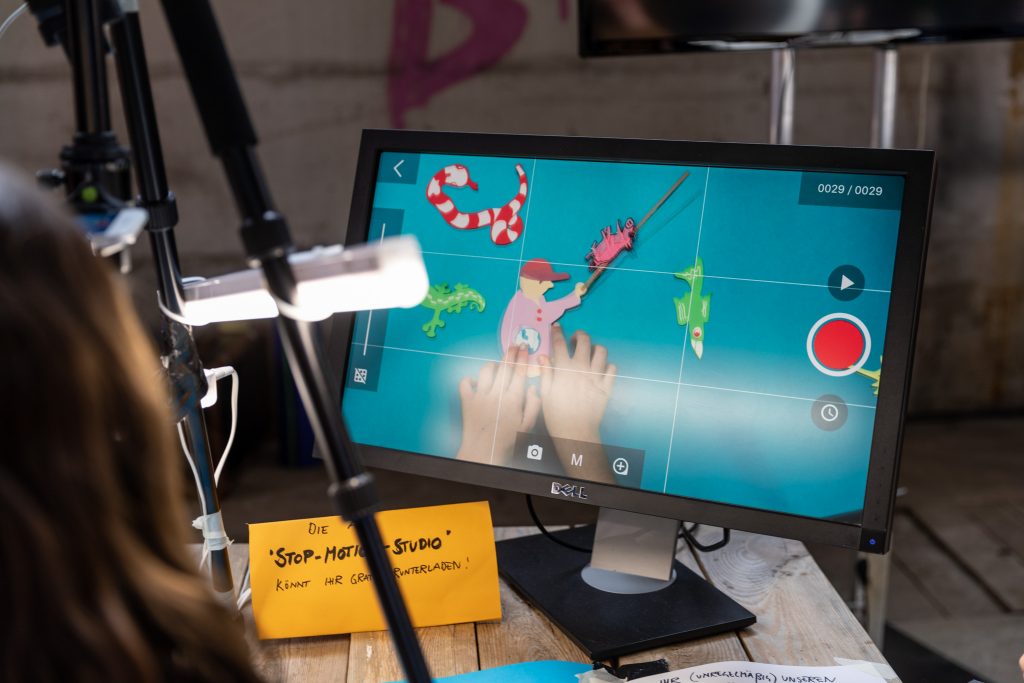
Sabine Zahn | “… flying like a bird”
The workshop “… flying like a bird” explores the influence of spatial conditions on the sensory appreciation of our bodies. What can be revealed about a location by consciously changes one’s own presence? What spaces are created when attention is focused on specific bodily mechanisms, thus consciously playing with the relationship between the body and its environment?
Workshop participants will investigate these interdependencies in a state of suspension between past and imminent future on the Spreepark site.
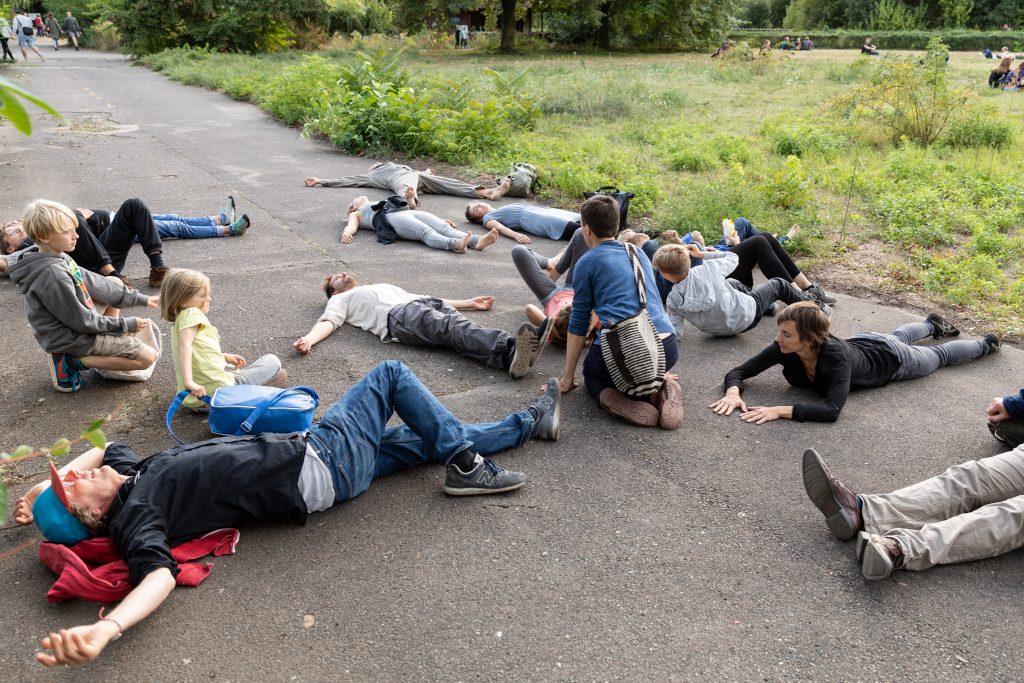
Ursula Maria Berzborn with Tom Mustroph and Hanna Zimmermann| Laboratory of Remembrance
Most people have fond memories of the Kulturpark Plänterwald (former name of the Spreepark): the Ferris wheel, merry-go-rounds and roller coasters brought variety to daily life, while restaurants and food stands catered to pleasures of the palate. At the same time, the huge amounts of visitors and socially maladjusted youths were a source of annoyance for some local residents.
The Laboratory of Remembrance travels back in time and collects impressions of the Kulturpark from 1969 onwards and the Spreepark from 1992 onwards. The aim is to bring together recollections of visitors, employees and local residents. The three-dimensional mobile of remembrance, with its integrated audio and picture archive, invites eyewitnesses and other interested parties to share their own memories and immerse themselves in the historical accounts of others.
Alexis Goertz (Edible Alchemy) | Herbal Trilogy
In this workshop, participants will be called upon to use their sense of smell, taste, touch, sight and even hearing to identify a range of wild plants, which they will get to take home with them in the form of individually created tinctures.
Together with Alexis Goertz from Edible Alchemy, the group will learn about regional roots, leaves, flowers and seeds in a workshop that combines traditional medicine and culinary art. The journey begins in the Spreepark, where participants will get to know the regions and seasons in which the plants grow, and which ones can be used in food, teas, tinctures and for other unexpected purposes.
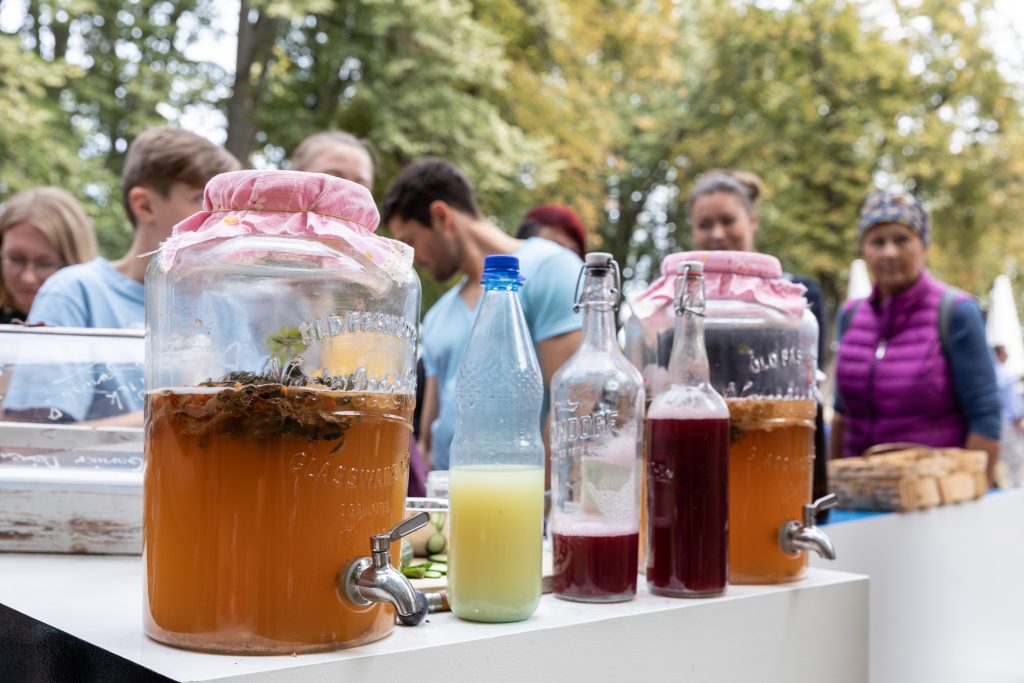
Jana Korb and Anja Gessenhardt | Bygone Arts
Besides rides and gastronomic offerings, the numerous stage shows in the Kulturpark and later the Spreepark enjoyed huge popularity – from music to theatre, from circus acts to extravaganzas. These shows make up a vital part of the memories of the people who visited the park. But who were these artists who performed in the Kulturpark and the Spreepark? What shows were on offer? And how have they inscribed themselves into peoples’ recollections of the park?
This workshop addresses these bygone creative, artistic, musical and theatrical performances. Using photographs and archival footage as well as the personal memories and descriptions of the performers, participants will be given the opportunity to carry out research in conjunction with the moderator on site. Each workshop will feature a different performer from the time, who will be on hand to discuss their experiences.
Gernot Wieland | A View from the Future
In this workshop, participants will be transported into the future and “remember” the Spreepark as it was in 2025, the fictive year of its opening. Together they will devise a project, envisaged as a time capsule, in which they will reflect on social, political and personal ideas using creative means. Doing so they will consider the impermanence of such undertakings and the different personal expectations of projects like these.
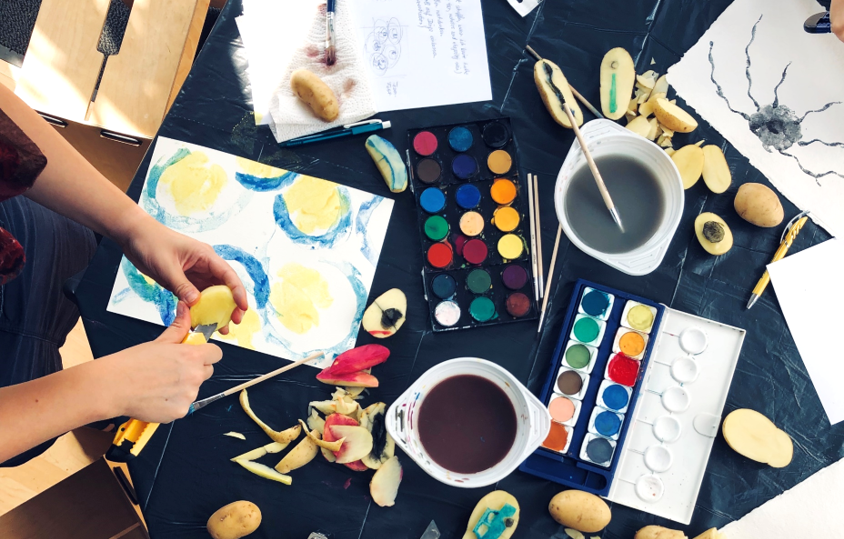
Ella Ziegler in collaboration with artistes from the Circus Schatzinsel | STATICA
Inspired by the architecture of the rides at the Spreepark, Ella Ziegler and artistes from the Circus Schatzinsel will devise living sculptures – and doing so make static phenomena physically experienceable. After a theoretical introduction to the constructions in the Spreepark by an engineer, the human body and its locomotive system will be explored. Consequently, participants will practically investigate the acquired principles of statics and dynamics on their own bodies: in performing acrobatic sculptures and movement sequences they will experience – through physical strength alone – how forces can create impulse, movement and stability.
Lukas Matthaei and Sebastian Quack | PLÄNTERWÖRLD 2 – tuned attractions
Usually, theme parks are there to offer entertainment to “fully abled bodies” – read “normally” functioning bodies – by pushing them to their limits, confusing their senses or transferring them to artificial realities. “PLÄNTERWÖRLD 2 – tuned attractions” inverts this relationship: working with a group of designers, Lukas Matthaei and Sebastian Quack want to construct attractions themselves – from the perspective of and in co-authorship with people who, due to a specific physical or mental particularity, have a different understanding of the world. As such, different perceptions of time and speed, the surprising and the ordinary, pleasure and frustration will be employed as a benchmark.
Together they will develop practical ideas for a Park of the Many, including a continuation of the office chair ride from their previous “PLÄNTERWÖRLD” project. The workshop series culminates in an open space for reflection, discussion and experiment in the context of the “Open Spreepark Day” on 15 September.
Spreepark Open Day (14/15 September 2019)
The Spreepark Open Day on 14 and 15 September 2019 invited the public to learn more about current developments at the Spreepark. During the first day, (14 September) the Senate Department for the Environment Protectionis, Transport and Climate together with Grün Berlin GmbH focussed on the ongoing participation process regarding themes such as transport, infrastructure and cultural offerings. On the second day (15 September), the ZKR offered insights into projects at the intersection of environmental education, cultural education and artistic research.
Discussions, guided tours, workshops and performances allowed visitors to come into contact with the artists and see the provisional findings of their research first-hand. It was a day on which the past, the present and the future of the Spreepark were creatively examined in equal measure.
Programme 15 September 2019
Soapbox Spreepark (12.00–18.00)
The “Soapbox Spreepark”, created by raumlaborberlin, hosted discussions on topics regarding the Spreepark in four chapters.
12.00: Greeting and introduction
Introduction by Katja Aßmann, artistic director ZKR
12.30–13.30: Spoken narratives
The myth surrounding the Spreepark isn’t just based on historical occurrences, but rather on spoken accounts and individual memories. This is where workshop leaders, educators and artists take up the baton. In the chapter “Spoken narratives”, we follow in the footsteps of oral history: first we embark on an audio journey through time with Hans Hs Winkler, taking in the punk movement in East Berlin and other destinations; then we listen to Ursula Maria Berzborn and the stories of her “Mobile of Remembrance”, hear about the Spreepark in a bygone era from stage artists of the time before envisaging a “future past” with Gernot Wieland.
12.30: Lecture performance: “Subculture in the Spreepark” by Hans Hs Winkler
13.00: Discussion, with contributions from Ursula Maria Berzborn, Jana Korb and Gernot Wieland
14.00–15.00: Inclusive perspectives
Art, culture and nature will the guiding principles in the Spreepark of the future. In order to design a “Park of the Many”, we aim to include disabled and non-disabled artists and experts in the planning process and experiment with different collaborative forms. In the chapter “Inclusive perspectives”, Jutta Schubert provides information on the subject of “Art and inclusion”, before Lukas Matthaei and Sebastian Quack talk about their project “Plänterwörld”, a quest for attractions that don’t merely conform to normalised needs but enable a new kind of amusement.
14.00: Talk: “Art and inclusion – an overview of creative enterprises by disabled people“ by Jutta Schubert
14.30: Discussion, with contributions by Kulturspreepark e.V., Lukas Matthaei, Sebastian Quack and other experts
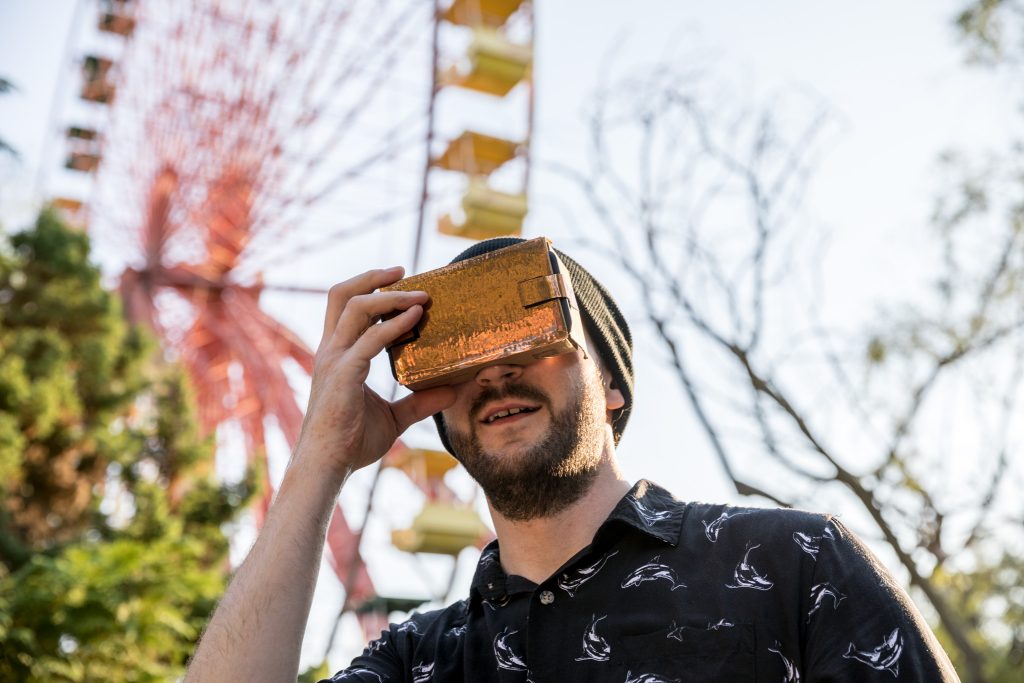
15.30– 16.30: Urban narratives
“Urban narratives” addresses the question of how artistic strategies and planning assignments can be combined. Jan Liesegang, member of the collective raumlaborberlin, provides insights into the role that art can play in the context of urban planning. Sabine Zahn’s artistic research examines the reciprocal relationship between the environment and the perception of the body, the findings of which visitors can re-enact using a “movement map”. Ella Ziegler’s workshops with circus artistes, on the other hand, invited participants to experience the ride architecture and their structural principles on their own bodies.
15.30: Talk: “Show me, don’t tell me” by Jan Liesegang
16.00: Discussion, with contributions by Ella Ziegler and Sabine Zahn
17.00–18.00: Looking to the future
Artists, cultural actors and creatives often have a different view of the world to the rest of us. They look for hidden structures, present new perspectives and live the future in the here and now. In “Looking to the future” we will engage in creative thought experiments and use artistic research to preserve the spirit of the Spreepark also when considering the future: Stefan Shankland turns our attention to seemingly useless material on the site; Bettina Klein explores the potential of artist’s residencies in the Spreepark, while Hans Hs Winkler draws a line between the past and the future of the area.
17.00: Talk: “Spreepark as material” by Stefan Shankland (in English)
17:30: Discussion, with contributions from Bettina Klein and Hans Hs Winkler
18:00: End
Accompanying programme (in the factory hall and park, 12.00–18.00)
12.30 and 14.00 In two workshops with Ella Ziegler and artists of Circus Schatzinsel Berlin, visitors are given the opportunity to experience static phenomena on their own bodies.
14.00–16.00 Following on from the exercises in his workshops, Gernot Wieland and Carla Åhlander present a writing workshop at the intersection of text, drawing and photography.
15.00–16.00 In an informal table talk, Hans Hs Winkler offers insights into his comprehensive sound archive on the oral history of the Spreepark. New stories and memories are welcome!
17.00–18.00 Sabine Zahn presents the results of her workshops, attended by around 60 adults and children, in the form of a “movement map”, which allows participants to navigate the park grounds in an unusual way.
12.00–18.00 Lukas Matthaei and Sebastian Quack’s experimental space presents alternative attractions that enable visitors to experience new types of entertainment beyond the bounds of normalised needs.
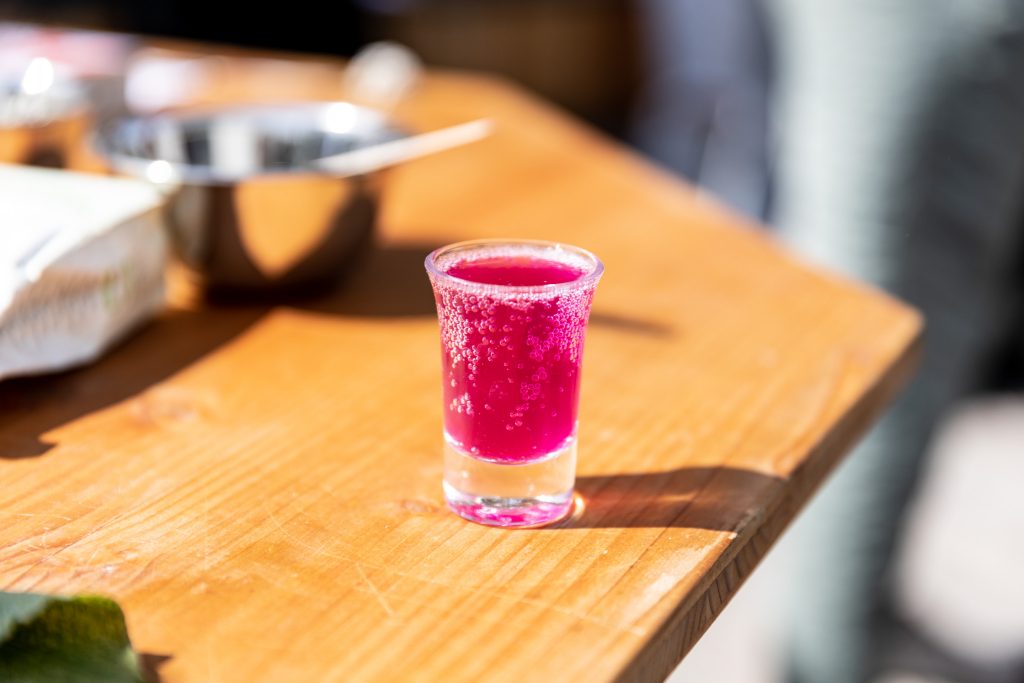
With their three-dimensional mobile of remembrance, Ursula Maria Berzborn, Tom Mustroph and Hanna Zimmermann offer the opportunity to exchange memories and immerse oneself in the past.
Alexis Goertz’s (Edible Alchemy) bacteria bar will be serving natural – if unusual – drinks made from regional and seasonal ingredients, including petals, herbs, tree sap, roots and microorganisms.
Jana Korb presents the first results of her history workshops as a proposal for future stage productions in the Spreepark.
The Moviemiento collective shows how stop-motion animation can be used to make films in an instant and presents works created by the talented young participants of their workshops.
Kulturspreepark e.V. creates poetic places of reflection where visitors can while away their time and fill the Spreepark with life in their own unique way.

